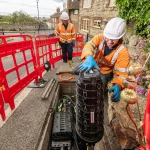Did Labour Just Complain the UK Gov’s Broadband Speeds are Too Fast?
Politicians, love them or hate them, they’ll often turn even a sane person barmy and that certainly seems to be the direction that some people may take when they listen back to a few of the comments that were spoken at today’s 2014 Parliamentary Internet, Communications and Technology Forum (PICTFOR) in Portcullis House.
Admittedly there are plenty of criticisms that could be thrown at the coalition Government’s national Broadband Delivery UK (BDUK) programme, such as the restrictions of their framework design that resulted in BT being left as the only viable bidder, a lack of support for FTTH/P connectivity and the general shunning of smaller alternative network (altnet) providers by failing to ensure good transparency over coverage, speed and cost commitments in the relevant contracts. We can think of a few more too, but any approach will always have its weak areas.
Advertisement
However, with a General Election just around the corner, it’s not surprising to find political rivals starting to throw criticisms around (i.e. more than usual) and there was certainly no shortage of that during today’s conference. Indeed some of the most scathing came from Labour’s Deputy Leader, Harriet Harman.
Harman took aim at the Government’s Digital Economy Minister, Ed Vaizey, whom she accused of being “complacent” over the progress of the BDUK deployment, which currently works predominantly with BT and aims to make fixed line “superfast broadband” speeds of greater than 24Mbps (Megabits per second) available to 95% of the population by 2017.
In particular, Harman suggested that Vaizey was focusing too much on rolling out superfast speeds and not enough to ensure that everybody could get a basic 2Mbps connection first.
Harriet Harman, UK Labour’s Deputy Leader, said:
“But I don’t feel that this Government has got the right level of ambition in relation to their role and the contribution government needs to make in driving forward connectivity. And two key issues right now are completing connectivity and ensuring digital inclusion.
By the time we left Government 74 percent of people had 5.2 MBPS and we were working towards our target of basic broadband for every household and every business by 2012. This target, which was regarded as realistic and achievable, would have meant that by now every household and business would have broadband access with decent speed.
But, when they came in, in 2010, the new Government scrapped the 2012 target, promising instead to roll out superfast broadband to 90% of the population by 2015. But that is not going to happen. Having scrapped our target of 2012, they’ve had to move their own target back from 2015 to 2017. Currently only 75% have superfast broadband.
So, though they’ve ploughed in £1.2 billion in public money, a quarter of the population still don’t have superfast broadband and many will have to wait till – or beyond – 2017. We estimate them missing their own target has lost the UK economy £7bn of foregone GDP. And it’s particularly a problem in rural areas.
The point is that government ought to be not just alongside but ahead of people, not dragging behind them. And there are massive complaints about this. With vociferous complaints to MPs – including on the Government’s side.”
It’s disappointing that Harman didn’t use the opportunity to attack some of BDUK’s actual failings, perhaps by also stating their own ambition for the future (we still don’t know what Labour’s official broadband policy post-2015 is and the recent activist report created more questions than answers), and instead focused on a comparison of old policy. It doesn’t help that she also got her “MBPS” (MegaBytes per second?) confused with Mbps (Megabits).
Advertisement
Firstly, on the original “basic broadband” commitment (i.e. 2Mbps for all by 2012), it’s important to remember that this was Labour’s policy agreed prior to the 2010 general election and one that had not yet formed a concrete plan for implementation. In other words, it’s unlikely that work could have started on its implementation until late 2010 or early 2011 (i.e. the usual administrative delays, consultations etc.) and quite how you’d then deliver 2Mbps using fixed lines to everybody in the remaining space of time we do not know (note: Satellite could already delivery this, but it’s an inferior technology for reasons of cost, capacity and flexibility).
On top of that if you’re going to spend millions upgrading old infrastructure in remote rural areas then surely it makes more economic sense to take a little longer and spend ever so slightly more in order to deliver “superfast broadband” speeds (24Mbps+), which is the approach taken by the post-2010 coalition government. This also avoids wasting money through duplication of the investment at a later date, although eventually even today’s hybrid-fibre services may need another upgrade, so there’s a separate debate to be had around that.
It’s also easy to forget that BT’s approach, while admittedly still delivering a slower and less reliable hybrid-fibre (FTTC) solution, is still being rolled out at an impressively fast pace given the complex reality of telecoms infrastructure work. Granted it would have been nice to see this benefitting remote rural areas first (sadly most of those are being left until last), but we can at least understand the network topology and cost reasons for building inside-out instead of outside-in.
Harman also re-played the old criticism of BDUK by saying that their own target of 2015 had been delayed, although this is rather unfair as it ignores how this reflects the lifted coverage target from 90% by the end of 2015 to 95% by the end of 2017. The last 5-10% is always slower to reach because in rural areas you end up spending more money in order to cater for fewer people.
Advertisement
Furthermore, recent predictions from Point Topic and BDUK suggest that the Government still stands a strong chance of hitting their first 90% target in 2015 and at worst it might slip by 1-2%, which given the complexity of this rollout is still pretty good for any Government project.
Finally, Harman suggests that the Government’s policy “has lost the UK economy £7bn of foregone GDP“, although precisely how that value was reached we do not know. Even the best economists warn that trying to quantify the economic impact of broadband, especially when it’s reduced down to the difference between particular service speeds, is fraught with difficulty.
On the other hand Harman also made some perfectly legitimate criticism of the Government’s Mobile Infrastructure Project (MIP), which over the past two years has been scaled back from its original ambition and may still leave mobile notspots in its wake. The limited success of the business focused Connection Voucher scheme also took a few hits, although the latter was admittedly constrained more by EU competition rules than local policy.
In any case our view is that Harman would have been more effective had she highlighted the practical present-day problems with BDUK and built her attack by showing what Labour would do differently post-2015, as opposed to using an unimplemented and unfinished policy from pre-2010, which incidentally seemed unlikely to ever meet its own 2012 target, as a basis for the criticism.
Hopefully next year we’ll get to see a firm policy position for broadband from all of the major parties.
Mark is a professional technology writer, IT consultant and computer engineer from Dorset (England), he also founded ISPreview in 1999 and enjoys analysing the latest telecoms and broadband developments. Find me on X (Twitter), Mastodon, Facebook, BlueSky, Threads.net and Linkedin.
« UPDATE Government Brings FREE WiFi to 1,000 UK Public Buildings
UK ISP PlusNet Adds Useful Broadband and Phone Help Videos »

















































Comments are closed